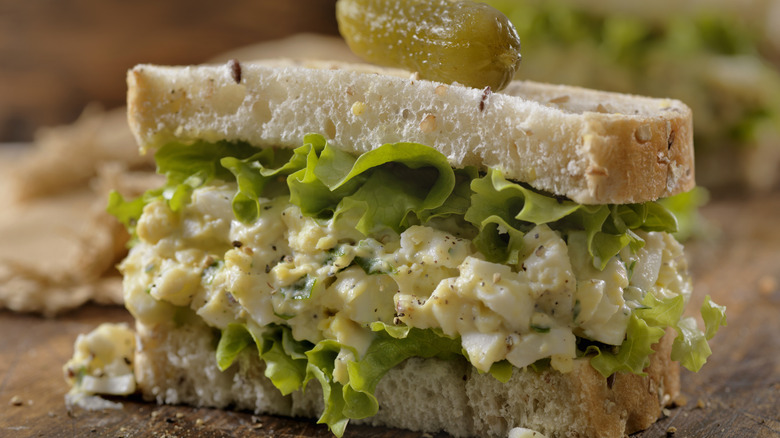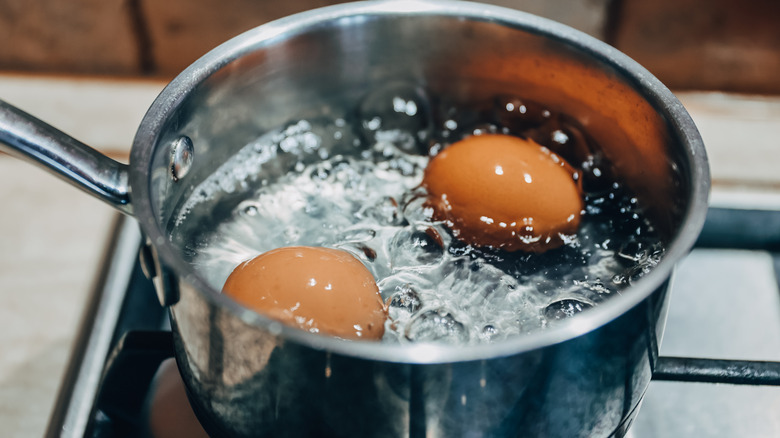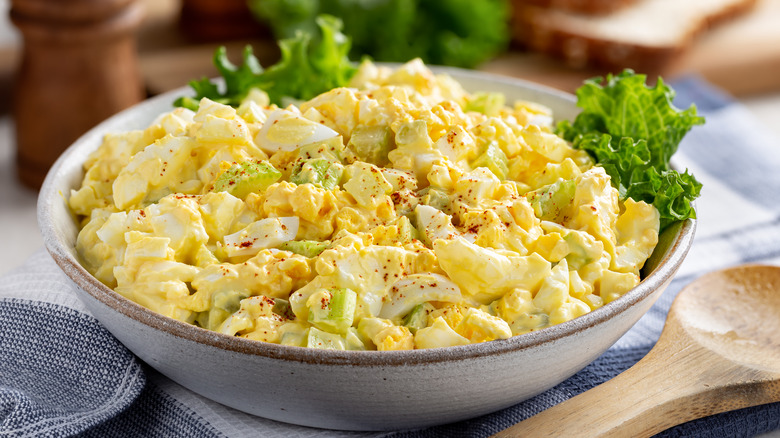The Secret To Boiling Eggs For Creamier Egg Salads
Ideally, a scoop of creamy egg salad is tangy with a kick of rich egg flavor, offset by mayo. The staple is the perfect filling for a sandwich, and it's a cookout classic. However, this is not always how egg salad turns out. Often, the hard boiled egg portion of an egg salad can go entirely wrong, with boiled eggs turning out rubbery and sulphuric rather than soft and creamy. This is because, all too often, boiled eggs end up being over-boiled eggs. But not to worry, there's a cooking method that ensures perfectly boiled eggs every time. And as it turns out, it doesn't require much boiling at all.
For this method, you'll want to add your eggs to your pot before your water, then cover your eggs with cold water. It is only then that you should set your pot on the stovetop. Once your eggs are on the stove, turn the heat up and bring your water to a boil — but this doesn't mean you should just let your eggs rumble around on the stove. Instead, you'll want to remove your eggs from the heat as soon as they begin to boil, and cover your pot. Depending on your preferred egg doneness, your eggs will finish cooking (off of the heat) in four to 15 minutes. For egg salad, you might want to err closer to 13 or 15 minutes, as egg salad requires a more solid yolk. However, the exact time depends on your personal preference.
A good egg should never boil
It might seem antithetical that a perfectly boiled egg isn't boiled. However, it's important to note that eggs are, after all, a very delicate protein. It's easy to overcook eggs, especially when exposed to high heat for long periods. And you don't want to risk a green yolk. An over-boiled egg will develop a green outer layer around the yolk, which occurs through a chemical process in which the outer layer of the yolk turns to iron sulfide, which gives your egg a rotten taste and a tough, rubbery texture. The yolk can even become dry or slightly powdery, which is not the desired texture when making egg salad.
Cooking your eggs with residual heat, on the other hand, allows your eggs to cook more slowly — over a lighter heat — helping your eggs to achieve a creamier texture and a perfectly set (but not powdery) yolk. You should also add your eggs to your pot before adding water, because adding them after will increase the risk of your eggs cracking.
Adjusting your salad
Now that you know the secret to perfect boiled eggs (don't boil them), there are some adjustments you might want to make to your egg salad to account for the added creaminess of your perfectly cooked eggs. Because your egg yolks won't have that powdery texture, there is no need to overuse mayonnaise in your egg salad. For this reason, you might want to adjust the amount of mayonnaise you use in your mix, using less than you'd typically use.
But that doesn't mean you must strip down your egg salad entirely. Other add-ins can help to bring out the oomph in your creamy egg salad. Dijon mustard, for example, is a great addition to the dish, adding a punch of flavor without the heaviness of mayonnaise. And crunchy ingredients, like chopped onions, can add some texture to your recipe. But if you love an extra crunch with a briny taste, it's worth noting that cornichons are the ingredient your egg salad is missing. Cornichons can bring a punch of flavor and the same vinegar kick that mayonnaise provides, while letting those perfectly cooked eggs shine.


